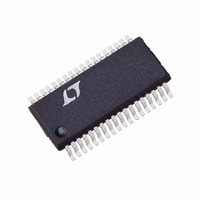LTC1709EG-7 Linear Technology, LTC1709EG-7 Datasheet - Page 23

LTC1709EG-7
Manufacturer Part Number
LTC1709EG-7
Description
IC SW REG STEP-DOWN SYNC 36-SSOP
Manufacturer
Linear Technology
Type
Step-Down (Buck)r
Datasheet
1.LTC1709EG-7.pdf
(28 pages)
Specifications of LTC1709EG-7
Internal Switch(s)
No
Synchronous Rectifier
Yes
Number Of Outputs
2
Voltage - Output
1.3 ~ 3.5 V
Current - Output
3A
Voltage - Input
4 ~ 36 V
Operating Temperature
-40°C ~ 85°C
Mounting Type
Surface Mount
Package / Case
36-SSOP
Lead Free Status / RoHS Status
Contains lead / RoHS non-compliant
Power - Output
-
Frequency - Switching
-
Available stocks
Company
Part Number
Manufacturer
Quantity
Price
Company:
Part Number:
LTC1709EG-7
Manufacturer:
LT
Quantity:
392
Part Number:
LTC1709EG-7
Manufacturer:
LT/凌特
Quantity:
20 000
Company:
Part Number:
LTC1709EG-7#PBF
Manufacturer:
Linear Technology
Quantity:
135
APPLICATIO S I FOR ATIO
(from 0.2 to 5 times their suggested values) to optimize
transient response once the final PC layout is done and the
particular output capacitor type and value have been
determined. The output capacitors need to be decided
upon first because the various types and values determine
the loop gain and phase. An output current pulse of 20%
to 80% of full-load current having a rise time of <2 s will
produce output voltage and I
give a sense of the overall loop stability without breaking
the feedback loop. The initial output voltage step resulting
from the step change in output current may not be within
the bandwidth of the feedback loop, so this signal cannot
be used to determine phase margin. This is why it is
better to look at the Ith pin signal which is in the feedback
loop and is the filtered and compensated control loop
response. The gain of the loop will be increased by
increasing R
increased by decreasing C
same factor that C
be kept the same, thereby keeping the phase the same in
the most critical frequency range of the feedback loop.
The output voltage settling behavior is related to the
stability of the closed-loop system and will demonstrate
the actual overall supply performance.
Automotive Considerations: Plugging into the
Cigarette Lighter
As battery-powered devices go mobile, there is a natural
interest in plugging into the cigarette lighter in order to
conserve or even recharge battery packs during opera-
tion. But before you connect, be advised: you are plugging
into the supply from hell. The main battery line in an
automobile is the source of a number of nasty potential
transients, including load-dump, reverse-battery, and
double-battery.
Load-dump is the result of a loose battery cable. When the
cable breaks connection, the field collapse in the alternator
can cause a positive spike as high as 60V which takes
several hundred milliseconds to decay. Reverse-battery is
just what it says, while double-battery is a consequence of
C
and the bandwidth of the loop will be
C
U
is decreased, the zero frequency will
U
C
. If R
TH
pin waveforms that will
C
W
is increased by the
U
tow truck operators finding that a 24V jump start cranks
cold engines faster than 12V.
The network shown in Figure 9 is the most straightfor-
ward approach to protect a DC/DC converter from the
ravages of an automotive power line. The series diode
prevents current from flowing during reverse-battery,
while the transient suppressor clamps the input voltage
during load-dump. Note that the transient suppressor
should not conduct during double-battery operation, but
must still clamp the input voltage below breakdown of the
converter. Although the LT1709-7 has a maximum input
voltage of 36V, most applications will be limited to 30V by
the MOSFET BV
Design Example
As a design example, assume V
(max), V
The inductance value is chosen first based on a 30% ripple
current assumption. The highest value of ripple current
occurs at the maximum input voltage. Tie the FREQSET pin
to the INTV
inductance for 30% ripple current is:
L
1 35
f L
V
300
.
OUT
OUT
Figure 9. Automotive Application Protection
12V
GENERAL INSTRUMENT
CC
kHz
TRANSIENT VOLTAGE
= 1.8V, I
H
1
pin for 300kHz operation. The minimum
1 8
DSS
SUPPRESSOR
.
50A I
30
V
V
V
OUT
.
1.5KA24A
MAX
%
PK
IN
RATING
10
= 20A, T
A
IN
V
IN
1
= 5V (nominal), V
A
= 70 C and f = 300kHz.
1 8
5 5
.
.
LTC1709-7
LTC1709-7
V
V
17097 F09
IN
23
= 5.5V












